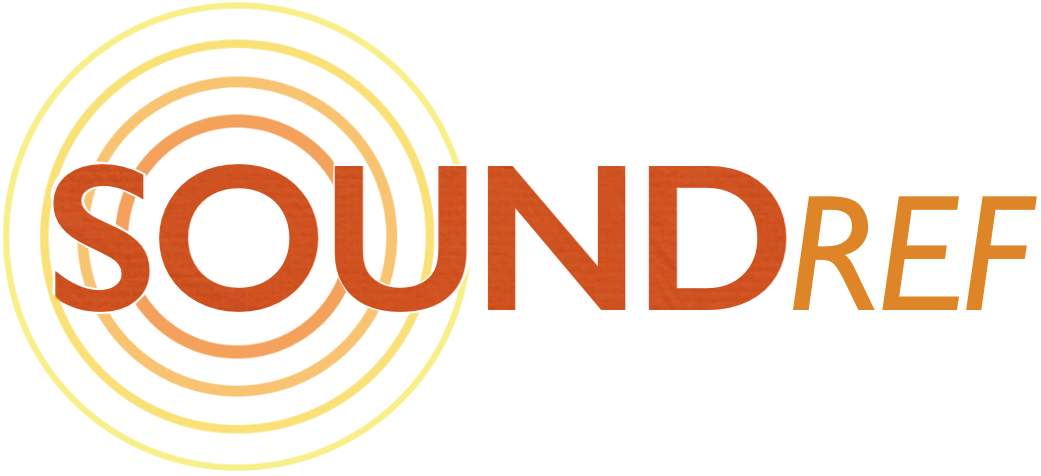Choosing the Best Computer for Music Production
Find your way through the music production jungle with this easy primer for beginners
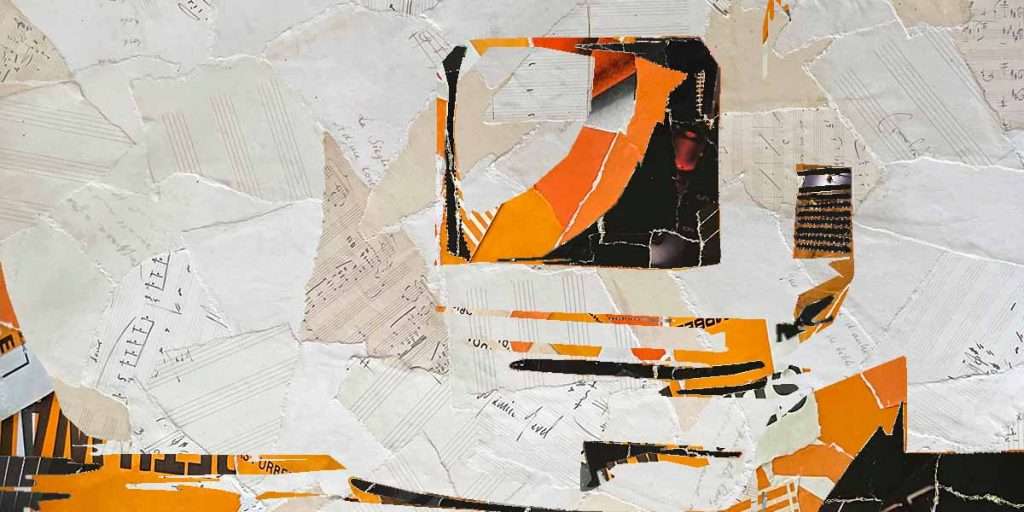
When it comes to choosing a computer for music production, everyones needs are different.
But whether it’s an Apple Mac mini, a desktop PC, or an Apple Macbook Pro, there’s some aspects that you have to get right. it has to be powerful enough for recording, and able to store and access large audio files.
Read this article to gain enough knowledge to choose the best computer for music production.
Contents:
There’s 3 simple concepts to get your head around
- Firstly, there’s the processor, or CPU. This determines how fast and powerful the computer is.
- Then there’s the memory, called RAM. This is like the brain of the computer which remembers all the tasks it’s doing at any one time.
- Next is storage. This is for keeping large audio files at hand for easy access.
All of the above come in different shapes and sizes. Once you know what you need, there’s 3 decisions to make:
- What type of ports do you require? You’ll need these to link with other devices.
- Will the computer stay on your desk, or be out and about?
Let’s start with the most important thing for music production, the processor…
Processor speed
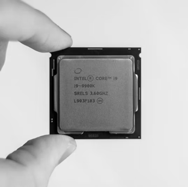
The processor, or CPU (central processing unit) is a tiny electronic circuit board, crammed full of miniature electronics. It takes data from the software, and processes it at speed.
The type of processor will determine just how fast the calculations are made. There’s two factors at play:
- Clock speed
The processor’s clock speed determines how fast it can retrieve, process and output data. They’re measured in GHz. As clock speeds began maxing out, the only way to speed processors up was by adding ‘cores’.
- Processor ‘cores’
Cores are individual units within the processor. Each core acts like a separate processor, enabling it to multitask. The more cores, the more tasks it can carry out at the same time.
For music production, aim for a minimum of 2.4 GHz, and 4 cores. Of course, the higher these numbers, the faster your computer will be. If you’re thinking of moving into video production in the future, best go for at least 3.6 GHz, 8 cores.
How much RAM?
RAM is the working memory of the computer. When the computer is running, the RAM fills with software files and data. The more programs you’re running, and the larger they are, the more RAM you’ll need.
You could probably get away with 8Gb of RAM for a modest music production setup. But if you’re planning to use large sample libraries, and multiple effects and plugins, I highly recommend having at least 16Gb.
What size storage drive?
Files are stored on a hard drive within the computer. Anything audio related needs a fast hard drive for a glitch free performance.
There’s 2 types of drive:
- SATA hard drive
These are the standard hard drives found in most computers. They have moving parts, and are prone to damage from shock. They’re reasonably fast and good value.
- SSD – Solid state drive
These Solid State Drives have no moving parts, and they’re much faster than the standard SATA hard drives. But they’re also more expensive.
The fast reading and writing speeds of SSDs are vital for music production. If your computer has only one drive, make sure it’s an SSD. But if it has two, you can use a standard SATA hard for system files, and a fast SSD for all of the audio files.
SSD Size
You could get away with a 500 Gb SSD, but I recommend having at least 1TB if you can afford it. Your storage needs will keep growing over time, as you accrue sample libraries and audio files.
Number of ports
Every computer has a number of ports, where you can connect peripheral devices, such as external hard drives or monitor screens. You’ll also need to connect an audio interface, which is the bridge between the computer and your studio monitors, and microphones.
Ports come with different connectors, such as USB or thunderbolt. Make a calculation of how many peripherals you’ll need to connect to your computer. And note what type of port you’ll need:
- Audio interfaces commonly connect with USB 2.0. But sometimes there’s also a Thunderbolt or Firewire 800 connecter. This gives you the potential of having a faster transfer rate, which is better for music production.
- Monitors tend to connect with HDMI, USB, DisplayPort, or VGA.
- External hard drives are available with USB, firewire or thunderbolt.
Extra ports
If you run out of ports, there’s always the option of a hub, which splits one port into several. Or use a converter to change from one port type to another.
Don’t forget to add an extra port for keyboard/mouse, headset, webcam, if you’re planning to use any of these. Desktop computers tend to come with a good selection of ports, whereas laptops can be a bit limited.
Choosing a computer monitor for music production
If you’re using a laptop, you can make life much easier by having an external computer monitor. There’ll be room to see your full DAW software alongside any plugins while you’re producing music.
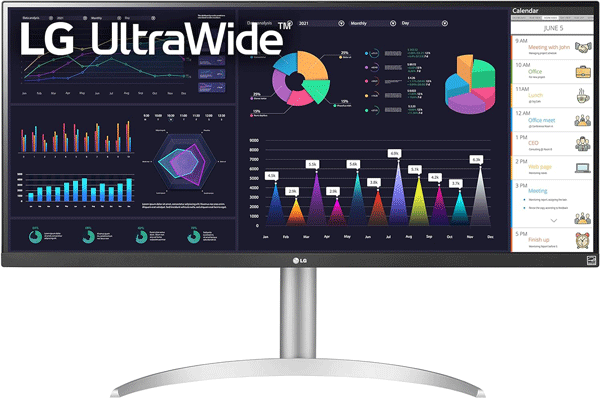
When choosing a monitor, don’t worry about the screen resolution, the software doesn’t need it. Just look for something big, like a 32″ wide screen. Some media composers like to have 2 screens – one for the music software, and the other to show visuals.
The LG 34WQ650-W (Amazon) is a decent quality wide screen monitor suitable for both PCs and Macs. Or if you want something a bit smaller, take a look at the 27″ Dell SE2722HX (Amazon).
Of course, Apple make their own monitors to suit your Mac if you have one. They’re just very pricey!
Minimum specs for music production
I’ve put a guide together to help you choose the specs for your music production computer. It’s the minimum you’ll need for a comfortable experience.
But do consider that if you’re on a budget, it’s certainly possible to go a bit lower.
Likewise, if you’re planning to produce music with multiple orchestral libraries, or power hungry effects on 100s of channels, you’ll need to upgrade the specification.
| Processor | RAM | Storage | Ports | Screen |
| 2.4 GHz, 4 cores | 16 Gb | 1TB | 6 | 14″ |
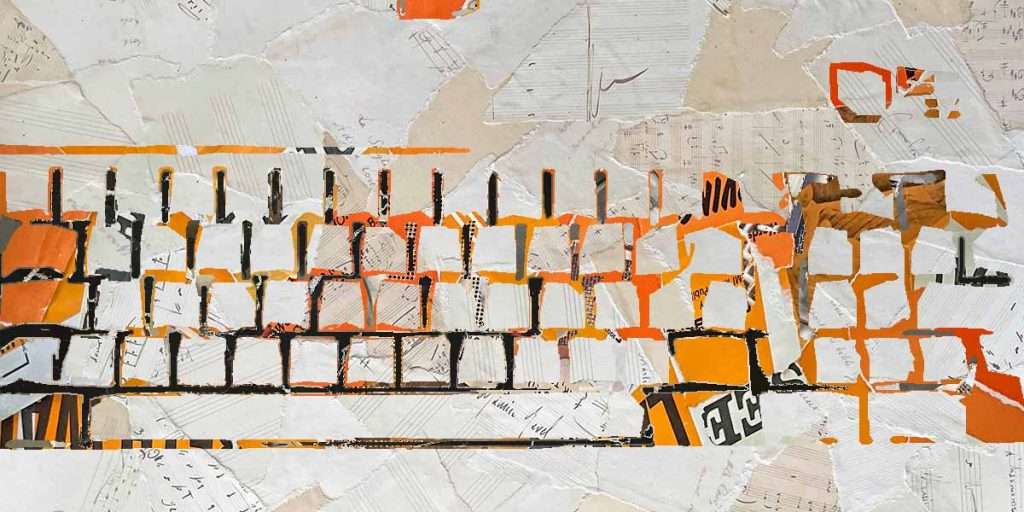
Laptop vs Desktop
Traditionally, studios would use one or more desktop computers for music production in order to record and playback samples. But recently laptops have become powerful enough to run all music production needs with ease.
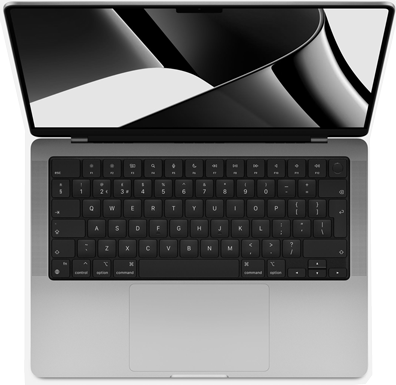
The advantages of a laptop are that you can take your studio anywhere. That means editing in cafes with headphones, or taking it onto a stage for live performance. Also, most people already have a laptop – there’s no need to buy two computers.
The advantage of a desktop is having even more power. If your music production involves multiple orchestral sample libraries, and a lot of tracks and effects, a desktop might be more suitable. You’ll also have the option of upgrading components when needed.
Desktops come in 3 configurations:
- Tower
These are the most popular, and can be anything from around 1 to 3 feet in height. They have plenty of room inside and are easily accessible for upgrades. These are quite typical for music production.
- Desktop
These lie flat on the desk, taking up more horizontal space. They don’t have room for all the fans of a larger tower, but can still be upgraded. Sometimes desktop PCs are made to fit racks, so you can store them with your other audio equipment
- Integrated
These are compact computers, built into the monitor screen. They’re a neat all-in-one solution, but very limited in terms of upgradability.
Noisy Computers
Something to be aware of within the recording environment is how noisy computers can be. Noise can come from the fan, or the whirring and clicking of SATA hard drives. This can be picked up by mics when recording, and can interfere while you’re mixing.
With a desktop computer, it’s possible to keep a noisy computer in another room, or in its own enclosure. But with a laptop, it needs to be quiet, as it’s going to be right in front of you.
Mac vs PC
The first question on most computer buyers’ minds is whether to go for a Mac or a Windows PC. There’s no shortage of strong opinions here.
Back in the last century, when I bought my first music computer, the only serious choice for music production was a Mac. And it’s true that they’re still used in most high end recording studios today.
But PCs are now also a viable solution for music production if they have the right spec.
Consider also that for a similarly spec’d Mac or PC, the PC will be far cheaper. It’s no wonder that so many small studio owners now use PCs.
Add to that the fact that PCs are easy to upgrade. Whereas most MACs don’t have that option – you’re stuck with what you’ve got.
So why even consider a MAC for your studio?
Apple Macs
Pros:
- High quality
- Stylish
- Easy to use
Cons:
- Not upgradeable
- Expensive
Every Apple Mac computer can be used to run a home recording studio – both laptops and desktop models are great for music production.
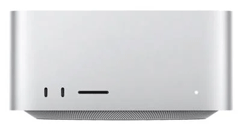
Macs are well built machines, with high quality components. Apple recently began using their own M1 processors, which has been a game changer in terms of available power.
Mac have their own operating system, called MacOS, which is known to be stable and predictable. This is great for music production – you don’t want the system to crash midway through a take.
The best thing about Apple Macs is they’re easy to use. And they rarely go wrong.
But there are limitations. Only their top model is easily upgradeable. Meaning once you choose your spec (processor, RAM, storage), you’re stuck with it for good. And then, if you want to upgrade your Mac, you might find that all the ports have changed, leaving you with no option but to upgrade your soundcard too.
All of Apple’s computers are suitable for music production. They come preinstalled with Garageband software so you can start making music out of the box. They also have their own DAW software, an industry standard, called Logic, which is only available for Macs.
Desktop Macs
There’s four desktop models to choose from:
- Mac Pro (Apple)
This is the big daddy of Macs for music production. Insanely powerful, but also prohibitively expensive. It’s easy to pay 10s of thousands of dollars for these. And that’s why you’ll only find them in pro studios that need that sort of power.
On the plus side, Mac Pros are fully upgradeable.
- Mac Studio (Apple)
The Mac Studio is the new member of the Apple family. It’s a computer built solely for professional creators. There’s more than enough power here for music production.
You’ll need a separate monitor.
- iMac (Amazon)
The iMac is an all-in-one computer solution, with everything built into the monitor. It’s incredibly stylish, but remember, there’s no option to upgrade internal components at a later date.
With an M3 chip, it’s a powerful enough machine for music production, and a great choice for anyone starting out.
- Mac Mini (Amazon)
The latest M2 Apple Mac Minis are powerful little computers, and can easily handle the demands of music production. You’ll need to buy a separate monitor too.
Apple Mac Laptops
Mac laptops are slim and well built. Perfect if you need to take your studio with you. Or if you want to look good at the cafe!
- Macbook Pro (Amazon)
Macbook Pro’s are incredibly popular for music production. I used the same Macbook Pro for 10 years, before upgrading to the latest Macbook Pro 14-inch with an M3 chip. They’re fast and powerful, and have a good selection of ports for connectivity.
- Macbook Air (Amazon)
This is Apple’s lightweight laptop. It’s super slim, and easy to take anywhere. It’s incredible that such a small piece of equipment can run a whole music production studio.
The M2 Macbook Air takes laptops to new heights, with ultra fast processing and a high impedance headphone socket
If you go for one of these, make sure to consult the chart above for minimum specs when ordering.
iPad for music
iPad’s are powerful machines and the Pro models share the same M2 chip as the more expensive Apple computers. You can certainly use an iPad for music production tasks, but I wouldn’t recommend it as the main computer.
Use an iPad for music related tasks, such as:
- recording on the move
- as a synthesiser
- as a drum machine
Some DAWS have iPad apps. These are great for working on your music on the go. You can continue the more detailed work back at the main computer.
- iPad Pro (Amazon)
Available as 11″ or 12.9″, these have an eight core M1 chip, making them as powerful as a laptop. I have the 12.9″ iPad Pro (5th generation), with an Apple pencil. I use it for music, organising research, and creating the illustrations on this site.
- iPad Air (Amazon)
The 5th generation iPad Air has the same M2 chip as the iPad Pro above. It comes in a smaller and lighter 10.9″ size, and various colour options.
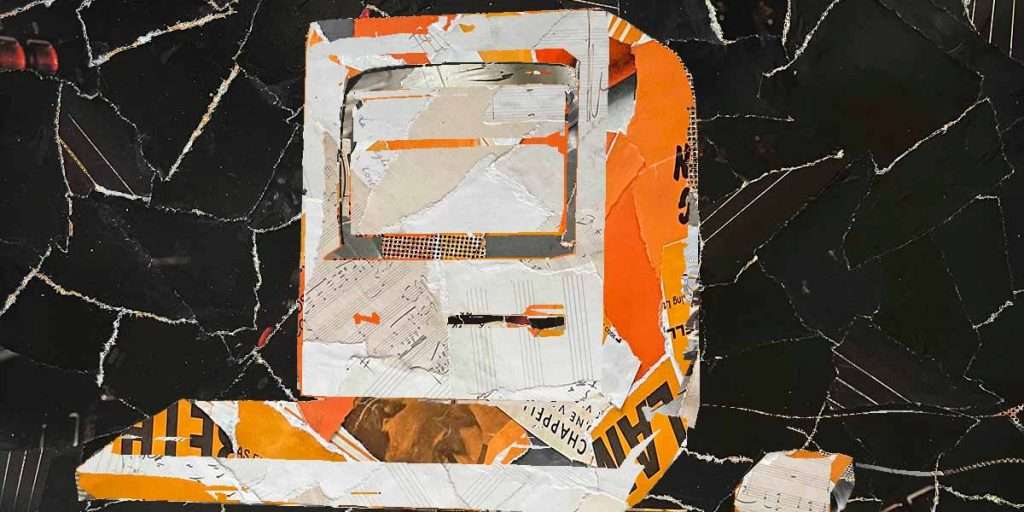
Windows PCs
Pros:
- You can upgrade in the future
- You’ll save money
Cons:
- Overwhelming choice
- Not all models will work for music production
- Can’t use Logic Pro software
Apple Macs are said to be more intuitive than Windows PCs. But if you’re already familiar with the Windows environment, you might want to stay with it. After all, once you’re up and running with the software, the experience will be virtually identical.
Windows Computers for music production
Unlike Apple Macs, you can’t just buy any Windows PC off the shelf for music production. Many of those cheaper Windows desktop computers simply don’t have the raw power you’ll need for recording.
I’ve selected two Windows desktop computers which will work for music production:
- Dell XPS 8960 (Amazon)
The Dell XPS 8960 is a refresh of the old 8950. It was originally developed for gaming, with an Intel Core i7 processor. But despite its gaming origins, it has a rather utilitarian and conservative exterior, more suited to a home recording studio.
The XPS 8960 is liquid cooled, meaning no fan noise, which is a real bonus for the recording environment. There’s also 2 hard drives – one of which is a Solid State Drive, crucial for fast audio file transfers.
- Microsoft Surface Studio 2 (Amazon)
This is a Windows desktop computer, rivalling Apple in both its processing power and looks. It uses an i7 processor and comes with either 16 or 32 GB of ram.
And it’s not just great for music production. Its also a beast for all your creative tasks – the 28″ PixelSense screen tilts like a giant tablet which you can draw directly onto.
The surface studio has just one hard drive, either 1TB or 2TB. Crucially, it’s a solid state drive, meaning super fast transfer of audio files.
Custom music PCs
If you’re not too familiar with computers, or you’re crossing over from Apple to Windows for the first time, I advise buying one from an audio company like Scan Computers. They’ll provide you with a fully tested machine, with all the software preloaded and working.
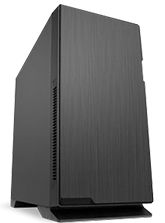
You’ll have a laptop or desktop with the stability of a Mac, but with an extra advantage. You’ll be able to update the hard drive, the RAM, and even the processor as your studio grows.
You’ll also have access to a specialised support team in case you encounter any problems.
Build your own PC
Another option is to see what components the custom builders are using, and make one yourself. It’s a way to save some money if you’re on a tight budget.
You’ll have to install your own software and drivers, and work out any conflicts yourself. And of course, there won’t be any customer support to turn to when things aren’t working out. But many people are successfully building their own PCs for music production, and posting their journeys online.
DAW software requirements
If you know which Digital Audio Workstation software you want to use, check on their website to see what the minimum requirements are before buying the computer. Here’s links to some common ones:
If you’re yet to choose your workstation software, read this comprehensive guide:
In conclusion
There’s a vast array of computers for music production available. As long as you’re meeting the basic requirements for your needs, the decision largely comes down to personal preference.
Making music needs to be as painless as possible, so use the operating system you already know. Pair your dedicated computer with suitable DAW software, and a good audio interface, and you’ll be ready to go.
Education is the key to getting a pro sound. I’ve made a guide to help you choose from the Best Online Music Production Courses available right now
Author: Daren B

Daren studied classical piano and composition at Trinity College of Music, at undergraduate and postgraduate level.
His music has been performed at the Southbank Centre, Tate Modern, and the Courtauld Institute, and broadcast on BBC Radio 3, Radio 4 and countless TV shows, including The Apprentice, Top Gear and Horizon.
Daren is a former lecturer on the BA Music Course at Goldsmiths College, University of London. He currently works in London as a composer and psychotherapist.
